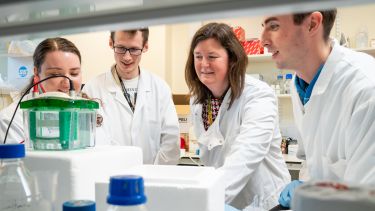- Researchers from the University of ∫˘¬´”∞“µ‚Äôs Institute of Translational Neuroscience (SITraN) have been awarded over ¬£1 million from Parkinson‚Äôs UK to develop a drug to slow down the progression of the degenerative disease
- Working together, the team of scientists from SITraN and the charity’s Virtual Biotech initiative aim to refine a molecule that can boost the function of the brain’s energy-producing mitochondria, to halt Parkinson’s progression
- 145,000 people are living with Parkinson's in the UK and there is a desperate need for new and better treatments
Scientists from the University of ∫˘¬´”∞“µ have been awarded ¬£1.2 million to develop a drug to protect dopamine-producing brain cells and slow down the progression of Parkinson‚Äôs Disease.
The funding from Parkinson’s UK comes via the charity’s Virtual Biotech initiative, which is plugging the funding gap in drug development and fast-tracking the development of new treatments for people with Parkinson’s.
A team of world-leading researchers at the University of ∫˘¬´”∞“µ‚Äôs Institute of Translational Neuroscience (SITraN), led by Dr Heather Mortiboys, has been working with experts from Parkinson‚Äôs UK to develop molecules that can boost the function of the brain‚Äôs energy-producing mitochondria to halt the degenerative disease - something no treatment can currently do.
Dopamine is a chemical which allows messages to be sent to the parts of the brain that help to coordinate movement. To do this effectively, the dopamine-producing brain cells need to be constantly active and they rely on mitochondria to function properly. Any disruption could lead to dysfunction and degeneration of the brain cells and eventual cell death. Parkinson’s is what happens when those cells die.
Earlier work from Dr Mortiboys, funded by a Parkinson’s UK Senior Fellowship grant, identified two molecules with excellent mitochondrial restoration properties.
The project continued with funding through the Virtual Biotech initiative and saw Dr Mortiboys work closely with Parkinson’s UK Drug Discovery experts. Together they made modifications to these molecules, which maximised their ability to boost the mitochondria without causing side effects. In a mould-breaking approach to drug discovery, scientists have been using cells from people with Parkinson’s and will continue to test molecules in these cells throughout and into the next phase of the project.
Dr Heather Mortiboys, Senior Lecturer at the University of ∫˘¬´”∞“µ‚Äôs SITraN, said: ‚ÄúTwo more people are diagnosed with Parkinson's disease every hour ‚Äì that's 18,000 people every year. Causing a loss of physical movement and uncontrollable tremors, the disease will affect 145,000 people in the UK alone in 2020.
“We’re delighted to continue our work with Parkinson's UK to refine these promising molecules to develop a treatment that could stop Parkinson’s in its tracks. The team has identified not only molecules which can restore mitochondrial function in dopaminergic neurons from people with Parkinson's, but also a novel mechanism by which they do this.
“We’re progressing both a novel mitochondrial therapeutic target and novel molecules which act upon this target. The aim is to have a lead molecule which is active at the mitochondrial target, can restore mitochondrial function in dopaminergic neurons derived from people with Parkinson’s and is able to get into the brain in a whole organism.”
The new project will bring together biology and chemistry experts from the University of ∫˘¬´”∞“µ, Parkinson‚Äôs UK and world-leading contract research organisations to further develop the modified molecules. This innovative team will investigate how the molecules work and what protein(s) they interact with inside brain cells. This next stage of the project aims to develop a drug-like molecule with good efficacy in cellular models of Parkinson‚Äôs. This would then allow future work to take place to assess the effectiveness of this approach in animal models before moving into clinical trials in people with Parkinson‚Äôs.
Dr Arthur Roach, Director of Research at Parkinson's UK, said: ‚ÄúWe‚Äôre excited to fund the next stage of this full-scale project combining our own drug discovery know-how with experts from the University of ∫˘¬´”∞“µ and two world-leading contract research organisations. Looking back, it‚Äôs incredible to see how this project had its origin in a small academic grant from Parkinson‚Äôs UK to screen for molecules that rescue defective mitochondria inside neurons. Since then, the charity and University have continued to work closely together to improve those initial compounds.
“This new funding will greatly accelerate the project and shows our commitment to working with ground-breaking academic researchers in the UK and taking their discoveries from the lab towards clinical trials. There is a desperate need for new and better treatments and we hope this project will one day deliver a life-changing drug for people living with the condition.”


